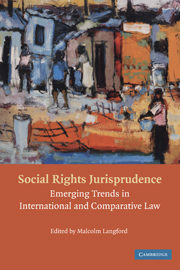Book contents
- Frontmatter
- Contents
- Foreword – Philip Alston
- Preface
- PART ONE OVERVIEW
- PART TWO SELECT NATIONAL JURISDICTIONS
- PART THREE REGIONAL PROCEDURES AND JURISPRUDENCE
- PART FOUR INTERNATIONAL HUMAN RIGHTS PROCEDURES AND JURISPRUDENCE
- 23 Committee on Economic, Social and Cultural Rights
- 24 Committee on the Elimination of Racial Discrimination
- 25 Human Rights Committee
- 26 Committee on the Elimination of Discrimination Against Women
- 27 Committee on the Rights of the Child
- PART FIVE SPECIAL TOPICS
- Notes on Contributors
- Table of Authorities
- Index
- References
27 - Committee on the Rights of the Child
Overcoming Inertia in This Age of No Alternatives
Published online by Cambridge University Press: 05 June 2012
- Frontmatter
- Contents
- Foreword – Philip Alston
- Preface
- PART ONE OVERVIEW
- PART TWO SELECT NATIONAL JURISDICTIONS
- PART THREE REGIONAL PROCEDURES AND JURISPRUDENCE
- PART FOUR INTERNATIONAL HUMAN RIGHTS PROCEDURES AND JURISPRUDENCE
- 23 Committee on Economic, Social and Cultural Rights
- 24 Committee on the Elimination of Racial Discrimination
- 25 Human Rights Committee
- 26 Committee on the Elimination of Discrimination Against Women
- 27 Committee on the Rights of the Child
- PART FIVE SPECIAL TOPICS
- Notes on Contributors
- Table of Authorities
- Index
- References
Summary
INTRODUCTION: OVERCOMING INERTIA IN THIS AGE OF NO ALTERNATIVES
It is ironic that an economic right, the right of the unborn to inherit property, is recognised and well protected by many countries. Yet, the economic and social rights of children, whilst alive, are rarely as well protected. This is despite the recognition by the Inter-American Court of Human Rights', amongst others, that the true and full protection of children requires their enjoyment of all rights, including their economic, social and cultural rights enshrined in treaty law, such as those in the UN Convention on the Rights of the Child.
The UN Convention on the Rights of the Child was, at its adoption, a pioneering global treaty embracing the full range of human rights – civil, political, economic, social and cultural – in one treaty with a unified monitoring body. At the time of drafting, some cynicism was expressed about the wisdom of this ‘alternative’ approach but time has shown that the holistic approach of the Convention on the Rights of the Child has served to challenge the concept that child poverty only concerns economic and social rights and that in order to eradicate child poverty the full range of rights needs to be considered. The importance of civil and political rights in combating child poverty ought not to be overlooked.
- Type
- Chapter
- Information
- Social Rights JurisprudenceEmerging Trends in International and Comparative Law, pp. 569 - 588Publisher: Cambridge University PressPrint publication year: 2009



